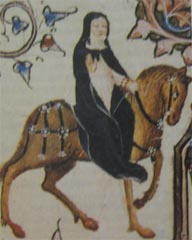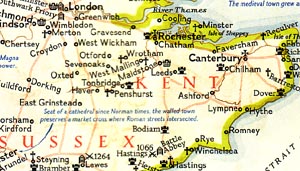
THE CANTERBURY TALES

Note that the work called the Canterbury Tales consists of a "General Prologue" or introduction in which Chaucer describes:
1. The circumstances resulting in all the pilgrims being together
2. Each pilgrim who is going along (to where?)
3. A series of tales that the individual pilgrim tells such as the "The Wife of Bath's Tale," "The Pardoner's Tale" etc.
 |
 |
||||
|
The Prioress
and The Miller The Ellsemere Chaucer |
|||||
Preliminary orientation:
1. Who is going where? How many pilgrims? Does Chaucer accompany them, and if so, how many Chaucers are there?

(National Geographic map of Medieval England)
(The point of origin is London, and the distance to____ is about 57 miles to this cathedral:

Answer the following questions based on the readings...
1. How do the Canterbury Tales differ from Anglo-Saxon literature in terms of theme, tone, style etc.
2. What is a frame story? How does Chaucer use it?
3. What figures of speech predominate?
4. What is a motif? How are they used?
5. Who is the "I" referred to in The General Prologue?
6. Relate Chaucer's work to the nominalism and realism controversy and the philosophy of the day, including how the philosophy influenced the social hierarchy--is the chain of being in evidence? Note that conflicting viewpoints emerge depending on how you "classify" the pilgrims.
7. How can the pilgrims be grouped? How many groups are there, and what are the implications for Medieval society? Be aware that Medieval England (Chaucer died in 1400) was in a state a flux. The traditional social order was consequently fluid, so two different but related organizational schemes are most likely present simultaneously. Note that your answer to question six should help.
8. Provide definitions for the following terms and note their relationship to Chaucer:
1. irony
2. satire
3. persona
4. frame story
5. physiognomy
6. metaphor
7. understatement
Conclusion: Be able to explain why Chaucer is considered the first great satirist in English literature and the father of English poetry.
THE OPENING OF THE GENERAL PROLOGUE derives its effectiveness from Chaucer's use of allusion to Biblical and classical allusions. Note the applications of the following allusions:
BIBLICAL: Then God remembered the animals that were with him in the ark, so God made a wind sweep on the earth and the waters began to subside.
CLASSICAL:
In classical mythology, a theory holds that natural forces are personified to be made intelligible--thunder god, river god etc. The god of the west wind was ZEPHYR. Psyche (life spirit or soul) was so lovely that the goddess of love, Venus , grew quite jealous and determined to punish her. She asked Cupid (love / peace/ order / non-violence---resides in the heart) to use his famous arrow to make her fall in love with something grotesque. Ironically two unexpected events occurred. Cupid fell in love with Psyche, and Psyche herself grew aloof and loved no one her herself. Apollo (wisdom, order, truth) said it was in reaction to Cupid's story. Apollo mandated that she had to remain apart until a horrid monster would marry her. As she sat alone, ...a swift breath of air came through the stillness, the gentle breath of Zepher, sweet and mildest of winds." The wind transported her to a beautiful field full rich in flowers. She awoke from a sleep with a premonition that she would see her future husband soon. At night, her husband came but as a test warned her that she could never attempt to see him. Urged to do so by her jealous sisters, she broke her promise and discovered her love was none other than Cupid. The god awoke from his sleep, saw her and fled saying there could be no love where trust was lacking. Heartbroken, Psyche searched for Cupid and ultimately had to ask Venus herself for assistance. Venus responded by making her undergo a series of impossible trials, one of which was to bring her "golden wool" from sheep grazing near a river. Looking at the water, she thought, "...to throw herself into it and end all her fear and pain.: She did not. Meanwhile, Cupid who had been imprisoned by the jealous Venus escaped (love cannot be held captive) and demanded from Zeus (idea of divine justice) that the marriage be allowed. Psyche was made immortal by Zeus who gave her ambrosia, and Venus no longer objected.
Understanding Chaucerian Satire
In order to appreciate whom Chaucer satirized and when, it is necessary to know something about the times in which he lived. The handouts you will receive describe several pilgrims and related cultural information mentioned by Chaucer in terms of how people really lived and loved and fought and died. Contemporary events are included as well as institutions. Use them in conjunction with this printout when analyzing the text...
DIRECTIONS:
1. Match the appropriate descriptions on the handouts with the pilgrims described by Chaucer in the General Prologue.
2. By knowing what conditions were [i.e. what Chaucer the_____knows philosophically, called________________vs. what Chaucer the_________ describes, called__________________], determine the extent to which Chaucer utilized satire and irony.
3. Overlapping is possible. One description of a pilgrim or character might apply to more than one pilgrim described in the text.
4. From your analysis, determine why the nominalist/realist controversy was so important in the 14th century. Consider here the ideal conditions vs. the reality of political and social and economic changes that must have been happening.
5. What were the implication for the chain of being?